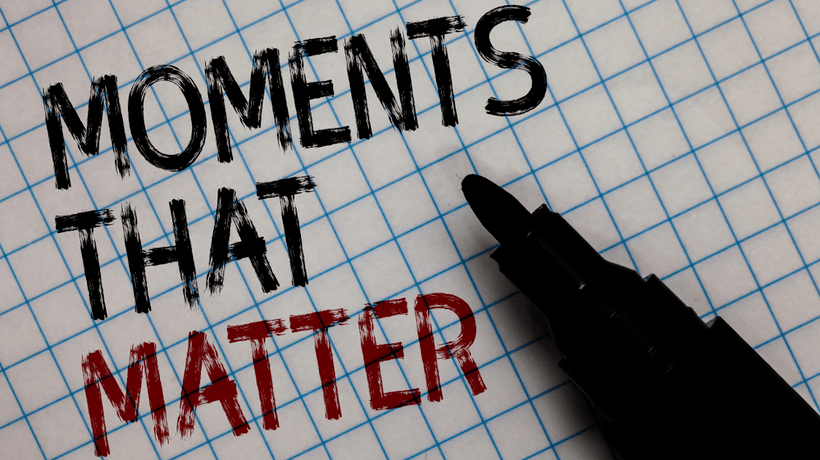Learn About The Moments That Matter (MtM) In Corporate Learning
Most businesses—while transforming their visionary statements, business operations, workforces, and value propositions for customers and partners—are now looking into human-centric approaches. The Learning and Development space is no different. And the impact on the individual's—learner—level in this area is often immediate and particularly visible. Needless to say, corporate learners are neither company’s fixed assets nor are their development goals are out of touch with basic human needs. Consequently, their learning experience is shaped not only by the contents of training materials and available assets but also—and foremost—by the multitude of intertwined emotional, behavioral, and cognitive aspects of the learning process.
Lehr-Ling’s Story
At this point, what we’ve so authoritatively stated calls for proofs and definitions. But let’s start differently, with a short story about a student. We shall call this student Lehr-Ling. (Lehrling in German means student.)
Lehr-Ling was stressing out the whole morning. She was a freshman at the Great School of Wisdom and Mindfulness, a renowned institution preparing future Knowledge Spreaders in the Land of Educat. Her first class was about to start in just a few minutes. But she didn’t have the slightest idea what to expect—no syllabus was available, no list of colleague apprentices was to be found, even the name of Master Lecturer wasn’t pinned to the classroom door.
"What are you doing here?" a man’s voice boomed from behind. Lehr-Ling jumped dropping down all her belongings. She was carrying a couple of handbooks, an audio recorder and a personal holograph display. Oh, she was ready for anything! There was gossip that the School had been struggling with teaching equipment and supplies essential for practicing knowledge-storing skills. Not to mention conducting complicated mnemotechnic experiments on human minds.
"I…I’m waiting for the Brain Wiring class, Sir," she mumbled. "But it’s already past 10 AM and no one else is here, so…"
"So, you’re in the wrong place, at the wrong time, and have the wrong attitude! All is wrong about you—Freshman," the man almost shouted at Lehr-Ling, pointing his finger at her. "Had you read the first chapter of the 'New Skilling Principles,' you would have known that the first term is self-study only, using your neuro-programming helmets back at home." He ground the words out through clenched teeth. "And by the way… I’m going to be your Master Lecturer starting from the Spring term. Good luck and goodbye!" He turned his back to her and strolled away down the corridor.
Lehr-Ling was left speechless with her eyes wide open and millions of thoughts running riot in her head. It was not going to be a great experience whatsoever.
Even though the short story about Lehr-Ling’s unfortunate events is imaginary and the Land of Educat doesn’t really exist, the feelings of pity or discomfort it may evoke are real. It happens because most of us have our own unique stories to tell about truly bad experiences associated with studying fresh knowledge or learning new skills. But this also works for highly positive events. We simply tend to remember the context of experiences when they carry an emotional load—when it’s particularly positive, there’s a bigger chance we’d want to repeat the experience; when it’s unpleasant, we’d want to avoid it in the future [1].
Back To Principles
The concept of "moments that matter" (MtM) in corporate learning comes with help and explanations on how this all can manifest in the Learning and Development space and why it should be of interest to L&D professionals. It serves a very broad definition of MtM in the context of adult learning and states that these are: “Negative or positive experiences related to the learning process, which trigger deep and lasting impressions on a learner.” These experiences can either reduce motivations or amplify them and, in turn, either decrease effectiveness of the learning process or increase it and sustain the learning outcomes.
The principles of the concept have been described in the eBook “Moments that Matter in Corporate Learning. Creating Impactful Learning Experiences.” This concept paper—created collaboratively by Marek Hyla, Ariel Wrona, Grzegorz Plezia and Nicolás Javier Omar—walks through a number of insights, recommendations, and discussion points on how various experiences affect learners’ emotions, motivations, commitment and engagement along the learning journey.
The concept itself comprises of 6 moments spread out across any kind of learning activity, be it a single training intervention or a multiphase, high-performance leadership program:
- Learning inception: paves the way for the learning journey of the learner
- Usage of the learning environment: empowers and supports the learner's efforts in the journey to competence
- Interaction with the trainer: leads the learner through all meanders of the learning journey
- Consumption of the learning content: helps to build intellectual foundations for new skills
- Practicing new skills: transfers learning experiences into individual capabilities
- Implementing new behaviors: embeds new capabilities in the flow of work.
Each of these 6 moments is built upon a mix of different experiences—in the case of this concept, collected in a defined catalog of 18 elements. Does it provide an exhaustive list of experiences? Probably not. Does it cover success factors though? Definitely yes.
Usage Of The Learning Environment Moment
To illustrate it better, let’s come back to Lehr-Ling’s story and have a closer look at the usage of the learning environment moment. We know from the conceptual framework that this moment sets its foundations on 4 experiences: great impressions, clarity, efficient technical support, and physical comfort. All of them carried for Lehr-Ling a strong negative emotional charge. And if we asked her whether any of these experiences contributed to her high commitment or deep interest in studying the subject, she would answer with a loud “No!”
- Great impressions?
Certainly not, considering stressful surroundings, unpleasant first meeting with the tutor, overall lack of organization and communication about logistics. - Clarity?
Nothing close to that. Lehr-Ling didn’t get any information about the program, preparation work, format, or delivery methods. She wasn’t even told who the other students in the group are, nor who the lecturer is. - Efficient technical support?
Again, a big miss. Do you remember the gossip about the school having almost no equipment available and not providing students with required training supplies? Lehr-Ling didn’t know what items she needed, that’s why she took everything with her. - Physical comfort?
Another no-no. The school didn’t secure learning space for the students who wished to self-study on the premises, lack of information became a significant distractor, and Lehr-Ling was forced to go back home.
I described the elements of the moments that matter in corporate learning concept using a negative narrative. We intuitively seek what is good and comfortable for us, what sparks positive emotions, what encourages us to learn, practice, experiment, and change in the directions we have assumed for ourselves. That’s why, knowing how negative experiences make us feel, it’s easier to articulate how positive experiences elevate us—by simple comparison.
Even though emotions, feelings, and attitudes are oftentimes intangible and hard to quantify or express verbally, they can be shaped and released by very tangible elements of the learning surroundings, Instructional Design principles, fixed and well-structured learning contents, competences of a skilled and professional trainer, and so on.
Conclusion
Finally, I want to leave you with a short thought exercise once you finish reading. Remind yourself: What was the worst learning experience you had in your professional life? And find the answer to the question: How could you change it to make it a great one?
References:
[1] What can the customer experience tell us about the learner experience?









